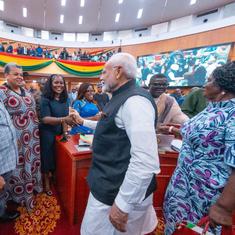US, Canada’s allegations not necessarily the same: S Jaishankar on claims about Sikh separatists
The external affairs minister said that if any country shares inputs that form a basis for concern, India is willing to look into them.

External Affairs Minister S Jaishankar said on Sunday that allegations made by the United States and Canada about India’s actions against Sikh separatists were “not necessarily the same”.
He made the statement at an event organised by the Rotary Institute in Bengaluru.
Jaishankar said that India is a responsible country and is willing to look into any input that forms a basis for concern.
“...The two issues are not necessarily the same,” the minister said in response to a question about India’s stance on the allegations. “When they [United States] brought up that issue, the Americans told us some specific things. What happens in international relations from time to time...such challenges can arise.”
On the allegations by Canada, Jaishankar said: “If any country, not just Canada, has a concern and gives us some input or some basis for that concern, we are always open to looking at it...So we very sincerely told the Canadians that look, it’s up to you, it’s your choice whether you would like us to pursue it, further look into it or not.”
A Decade of Change.
— Dr. S. Jaishankar (@DrSJaishankar) December 17, 2023
Speaking at the Rotary Institute 2023 event in Bengaluru. https://t.co/Tivb0EiycT
On September 18, Canadian Prime Minister Justin Trudeau told the Canadian parliament that intelligence agencies were actively pursuing “credible allegations” tying agents of the Indian government to the killing of Sikh separatist Hardeep Singh Nijjar.
Over two months later, on November 29, the United States Attorney’s Office, Southern District of New York, also announced that it had filed “murder-for-hire charges” against an Indian national named Nikhil Gupta in connection with his alleged participation in a thwarted plot to assassinate a Sikh separatist leader. Though the statement did not name the leader, a report in the Financial Times on November 23 identified him as Gurpatwant Singh Pannun.
On Trudeau’s allegations, India said that the claims were “absurd and motivated”. Following the accusations, India had suspended visa services but resumed some operations in October. India had also ordered Canada to withdraw over 40 diplomatic staff from the country.
On the other hand, in response to the allegations by the United States, India said it has constituted a high-level inquiry committee to examine the inputs. Ministry of External Affairs spokesperson Arindam Bagchi said that India is taking the inputs seriously “since it impinges on our own national security interests as well”.
‘UN Security Council like an old club’
Jaishankar on Sunday also said that the United Nations Security Council is like an “old club” that is unwilling to let in new members.
“Security Council is like an old club, where there are set members who don’t want to let go of the grip,” he said. “They want to keep control over the club. [They are] not very keen to admit more members, not keen to have their practices questioned.”
Jaishankar said that in the absence of reforms, the effectiveness of the Security Council is decreasing.
The United States, China, Russia, France and the United Kingdom are five members of the UN Security Council. They have the power to veto a resolution.
There has recently been a growing demand to increase the number of permanent members to represent the contemporary global situation. India is among the contenders for permanent membership of the UN Security Council









